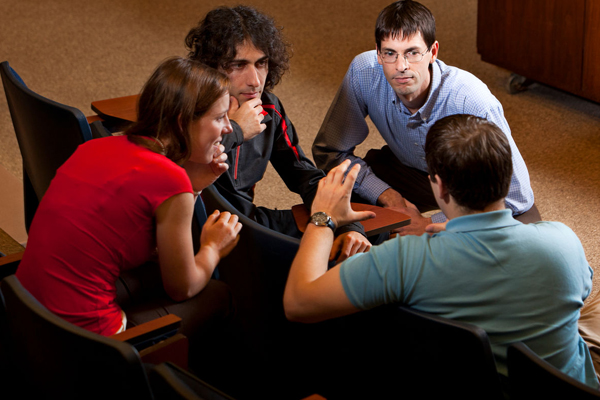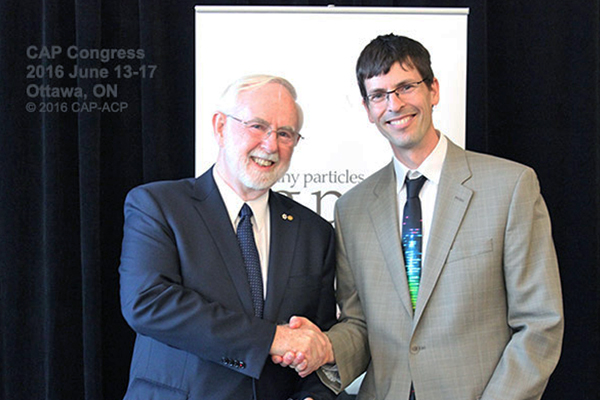A data-driven approach to education
August 3, 2016
Share
James Fraser (Physics, Engineering Physics and Astronomy) has long believed in the importance of encouraging his undergraduate students to work with their peers to improve their learning experience. Branching out beyond the traditional concept of a lecture, he worked to foster discussion, collaboration and a deeper understanding of the material.

For his innovative approach to education, Dr. Fraser recently received the 2016 Medal for Excellence in Teaching Undergraduate Physics from the Canadian Association of Physicists (CAP). He received the medal from a fellow Queen’s professor – Nobel Laureate Arthur McDonald – at the Recognition Gala during the CAP Congress in Ottawa on June 16.
“I’ve had a colleague say to me ‘you made your lecture into a tutorial,’ and I agree,” says Dr. Fraser. “Students appreciate it when they’re active participants in a lesson instead of a prof standing at the front telling them what they need to know. Most students appreciate the fact that their needs are leading the lecture experience.”
Over the past decade, Dr. Fraser has implemented a number of changes to how his first-year lectures are presented. Amongst a number of changes, students are given the full reading list ahead of time. He then uses their questions relating to the readings to guide each week’s lectures – allowing more time to focus on the aspects that created the most difficulty.

Students also spend a great deal of time working in groups which, Dr. Fraser argues, is an important part of the modern scientific process. From discussions during lectures to a collaborative re-write of the final exam, team-focused learning is at the centre of his lesson plan.
“Right from the start with my first-year students – whom I call my ’scientist apprentices’ – I want to instill in them what it means to be a scientist and the collaborative nature of science,” he says. “Maybe Einstein was able to sit in the patent office and come up with great ideas, but how many of us are Einstein? Even the most fundamental science research is team based. Even beyond academia, the non-traditional science careers – business analyst, teacher, etc. – are still collaborative in many ways. You might be able to get away with working as an individual, but you’ll get better results working with your peers.”
Dr. Fraser says that many of the changes he’s made in the classroom over the past decade came about through a two-pronged interest in both improving the learning experience for his students and being able to measure whether his approach to teaching was on the right track.
“I come at this from the point of view of an empirical scientist,” he says. “I needed better data from the class, to ensure that my students were absorbing and understanding the material. More importantly, I needed measurements during the class and not just afterwards in the final exam – when I couldn’t do anything about it.”